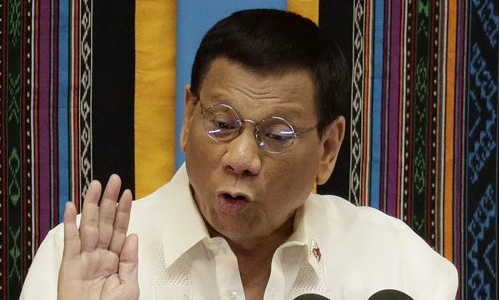HOME >> OPINION
Sino-Philippine bonhomie here to stay
By Zha Wen Source:Global Times Published: 2019/8/25 18:53:39

Photo: IC
Philippine President Rodrigo Duterte's upcoming visit to China, which begins Wednesday, has put relations in the spotlight.
During his visit to the Philippines in March, US Secretary of State Mike Pompeo reinforced the US alliance with the Philippines, declaring that "any armed attack on Philippine forces, aircraft or public vessels in the South China Sea will trigger mutual defense obligations under Article 4 of our Mutual Defense Treaty." In addition, a collision between Chinese and Philippine fishing vessels near the Liyue Tan (Reed Bank) in the South China Sea in June triggered a wave of protests against China in the Southeast Asian nation. In such context, some Western and Philippine media outlets began to speculate that Duterte would likely apply pressure on China during his visit with the 2016 South China Sea arbitration ruling, and that the "honeymoon" of China-Philippine ties may come to an end.
However, such speculation is nothing but hot air intended to disrupt China-Philippine relations. According to the Department of Finance of the Philippines, five agreements will be signed during Duterte's upcoming visit to China, his fifth official trip to the regional powerhouse since he took office. The deals would cover trade, infrastructure development, border control, etc and are meant to deepen cooperation between the two sides.
It should be noted that since Duterte was elected president of the Philippines in 2016, China-Philippine ties have improved substantially. During Chinese President Xi Jinping's visit to the Philippines in November 2018, the two heads of state decided to upgrade bilateral ties to "comprehensive strategic cooperation," which not only gave credit to the positive development of bilateral relations over the past two years, but also laid a firm foundation for further cooperation in the future.
More importantly, the basic development policy of the Philippines also underscores the significance of China-Philippine cooperation. In recent years, economic development of the Philippines has been on the upswing. Though confronted with inflation and unemployment, the country is still one of the fastest growing economies in Southeast Asia. Infrastructure development has played a critical role in boosting its economic growth. According to Duterte's plan, the Philippine government will raise infrastructure investment to 7.4 percent of GDP by 2022 from 5.1 percent in 2016. Continuously deepening economic cooperation with China is one of the essential external conditions to achieve this goal.
Of course, it is undeniable that the Philippines is still trying to strike a balance in diplomacy. Philippine-US security cooperation is highly institutionalized, and is unlikely to change in a short time. But it is worth emphasizing that the Duterte administration is quite aware of the US so-called security commitment. Especially in the context of the intensifying competition between China and the US, the Philippines will handle its relations with the US more cautiously and avoid becoming a tool for Washington to provoke China.
China-Philippine relations are in no danger of going into a tailspin in the near future. Yet we should still make more preparations for the long-term development of relations. It was reported by Reuters in early August that "Duterte has a consistent approval rating of about 80 percent but the same surveys show people in the Philippines mistrust China and want the government to fight its perceived maritime bullying." This reflects that many of Duterte's supporters support him more because of his social and economic policies, but they may not agree with his China policy.
More importantly, it also shows that many Filipinos have failed to understand the economic motivation behind Duterte's friendly China policy and haven't been able to recognize the economic benefits brought to the Philippines by China's rise. Duterte's political opponents have repeatedly attacked him for his China policy. In this sense, Manila's policy on China still has the possibility of being "hijacked" by domestic political rows, which is not conducive to stable bilateral relations.
To promote the long-term development of China-Philippine ties, we can generally make efforts in the following two ways. First, we should speed up the Code of Conduct (COC) negotiations so that the consensus reached by China, the Philippines and other Southeast Asian countries on the South China Sea issue can be institutionalized. Second, in the process of promoting assistance and investment in the Philippines, we should improve the transparency of projects and attach importance to local public opinion. Meanwhile, infrastructure projects with Chinese investments should promote local employment, so that ordinary people can benefit.
The author is an associate professor at the Institute of International Relations, China Foreign Affairs University. opinion@globaltimes.com.cn
RELATED ARTICLES:
Posted in: ASIAN REVIEW